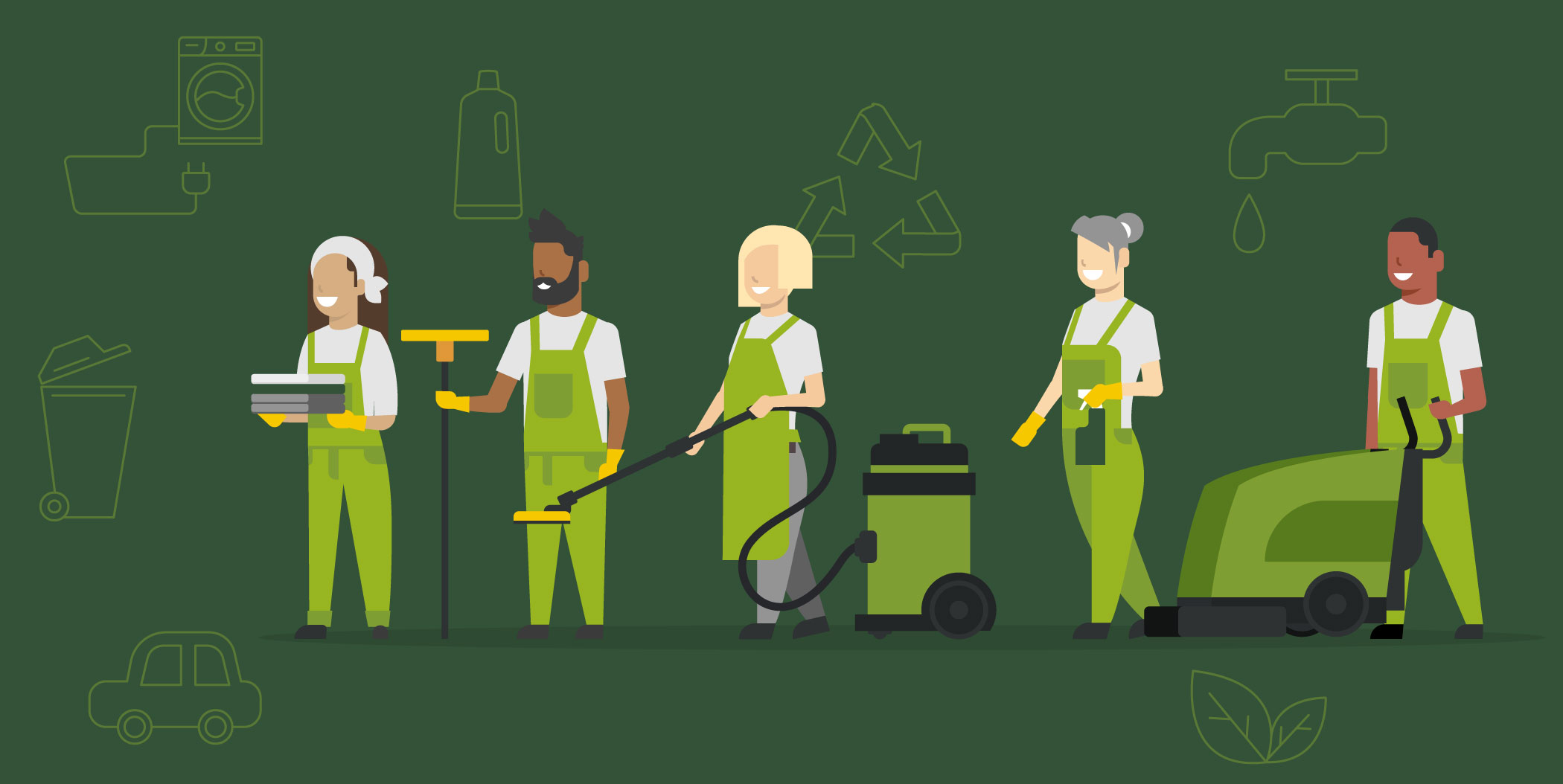The cleaning industry has a huge shortage of qualified workers and needs new ways to attract staff. This is one of the reasons why cleaning companies need to consider social sustainability. Both employees and clients are demanding a stronger focus on social responsibility, because the future regards the wellbeing of everyone. But how can your cleaning business implement social sustainability, and what are the benefits?
Understanding Social Sustainability: The S in ESG
ESG stands for Environmental, Social and Governance. These three parts serve as benchmarks for assessing a company’s environmental impact, social contributions, and governance practices. ESG reports are published annually to report results and to motivate the company to improve the numbers during the next year. It also demonstrates achievement to key stakeholders such as clients, employees, and investors.
Now, let’s go back to the topic of social sustainability, which prioritises principles and policies of people. Companies are encouraged to contribute positively and focus on the wellbeing of individuals. Social sustainability covers several areas, including health and safety, diversity, wages, equality, and education.
Every company in the world affects society through its approach to diversity and equality in the workforce. Positive impacts are seen when companies e.g. hire minorities to ensure diversity or uphold equal rights at work regardless of age, gender, or sexuality. Many companies also support NGO’s and charities, contributing on a scale few individuals can afford. However, some companies may be unaware that they preserve inequality at work through practices such as offering below-average wages, consistently hiring people who resemble themselves, or fail to provide health insurances. Results are usually that employees quit, your company receives public criticism, and a decrease in trust. Meaning that neither clients nor potential employees want to invest their time in your company. On the other hand, focusing on social sustainability can enhance a company’s reputation, attract and retain valuable staff, improve operational efficiency, and contribute positively to the community.
Three Categories of Social Sustainability to Simplify Implementation
Social sustainability can be divided into three categories, each focusing on specific groups of people. This categorisation makes it easier to manage and work with social sustainability.
Human Capital
The first category focuses on the individuals within your company and is in particular important for cleaning companies. Human capital encompasses well-being in the workplace, equal treatment, fair wages, and opportunities for skill development and education. One initiative could be as simple as ensuring compliance with the UK Government’s national living wage legislation, which came into effect in April 2024. The legislation increased the wage by almost 10%, from £10.42 to £11.44 per hour. This category encourages you to assess aspects of employee relations, development opportunities, and improvement of working conditions. Success in this category can be achieved through effective communication and seeking feedback from your employees.
Product Liability
Product liability is another critical area where your employees’ feedback can provide invaluable insights. This concerns the impact of your product and services on society, including safety, and quality of life. For example, consider the cleaning products your company uses and their chemical safety implications for both your clients and employees. Additionally, the privacy and safety of your employees are paramount; it is essential that your cleaning company ensures their data is secure and that you comply with relevant data regulations. Check up on your cleaning supplies, how they are made and how safe they are to use, focusing not only on chemical content but also on the physical demands placed on users.
Social Opportunities
In a similar notion as product liability, social opportunities focuses on “check-up”’s on the local community. Your cleaning company should aim to ensure that you have a positive impact on minorities or underprivileged areas. This could be initiatives of donation or volunteering led by your cleaning company. A tangible example might be organising a fundraising event with your employees. This is only an example of many. The key is to continually ask yourself, or reflect on, how your cleaning business can assist those who are less fortunate.

How to Apply Social Sustainability
To measure your cleaning company’s social impact, employ the use of Social Performance Indicators (SPIs). This framework helps measure your company’s actions, principles, and measures towards social sustainability. For instance, you could measure diversity among your employees in percentages (ethnicity, age, gender), or measure your company’s contributions in pounds. However, it is important to remember that measuring is not only based on numbers, as written explanations of the actions you have taken are also of value. These indicators not only allow investors, clients, and employees to understand your company’s social impact and ethical commitments but also help you identify areas for improvement and set new social objectives. Social sustainability begins with a thorough assessment of your current practices. Ask yourself: What social initiatives are we currently undertaking, and what new initiatives could we implement?
Human Rights Initiatives
As highlighted at the beginning of this article, the cleaning industry faces a significant staff shortage, with research from The Cleaning Show indicating that 50-60% of cleaning companies are unable to fulfil client contracts due to the labour shortage. Often perceived as a sector for unskilled workers, with solitary, unappreciated tasks performed at odd hours, the cleaning industry faces challenges in attracting and retaining staff. Concerns about the physical demands of the job and career prospects also decrease interest. Addressing these issues could enhance staff attraction. Here are several suggestions for Social Performance Indicators (SPIs) to implement:
- Diversity: Measure and improve workplace diversity by hiring based on skills alone. Ensure you comply with the Data Protection Act when managing employee data.
- Wage Increases: Adjust wages to at least match the National Living Wage, or exceed it to differentiate from competitors.
- Education and Skill Tracking: Measure the educational level and skills of your staff, and offer further education and skill development in cleaning or other relevant areas.
- Technological Implementations: Invest in new technologies and robotics to relieve parts of the physical strain cleaning tasks have.
- Health Insurance Provision: Ensure comprehensive health insurance for your staff, enhancing their job security and wellbeing.
Social Initiatives for Enhancing Your Products and Services
In addition to product liability, the ethics of your cleaning services play a crucial role. Below are several suggestions for Social Performance Indicators (SPIs) that can help ensure your operations are both ethical and sustainable:
- Ethical Sourcing: Ensure the cleaning products you use are ethically sourced and safe for your staff.
- Supply Chain: Examine your supply chain to confirm that your partner companies also prioritise on social sustainability. Sustainable partners strengthen your overall commitment to ethical practices.
- Data Protection: Familiarise yourself with the Data Protection Act to ensure safe handling of private data. This maintains trust and confidentiality with your clients and employees.
Initiatives for Supporting Developing Countries and Local Communities
There are numerous ways to make a positive impact, both locally, and for developing countries. While Local support is more visible by direct engagement, supporting developing countries often involves financial contributions to NGO’s. Here are a few examples of effective actions your cleaning company can do:
- Fundraising: Organise fundraising for events for NGO’s or local minority groups, it not only aids but strengthens community ties and local presence.
- Community Engagement: Participate in the local community by offering employment and other opportunities to residents of underprivileged areas. This approach helps local development and demonstrates your commitment to social responsibility.
- Local Support: Contribute to local sports, music, or other clubs. This type of support not only helps enrich the community but also builds goodwill and enhances your company’s reputation within the area.

Four Competitive Advantages of Social Sustainability
Taking action and measuring social sustainability initiatives not only improves your impact on society but competitive benefits in the cleaning market. Here are four key advantages on how social sustainability can elevate your cleaning company above the competition:
Gain Employee Satisfaction and Improved Efficiency
Ensuring that employees are safe, well-paid, and have opportunities for growth within a positive social environment is crucial for fostering employee satisfaction and a loyalty. A content and loyal workforce often leads to an increase in efficiency. Employees who work well together and feel a sense of purpose in their daily tasks are typically more productive. In contrast, unhappy and stressed employees tend not work as efficiently. Investing in the wellbeing of your staff not only enhances their job satisfaction but also boosts overall operational efficiency, giving your cleaning company a competitive edge.
Strengthen Your Company’s Reputation and Growth
When a cleaning company upholds high ethical standards and focuses on employee satisfaction and welfare, it significantly enhances the company’s reputation. This can lead to substantial growth, as it attracts skilled employees, and clients, and investors who prioritise sustainability. A company known for being fair and having a good workplace becomes a magnet for talent and business opportunities, positioning it well ahead of competitors in the industry.
Secure Better Risk Management
A positive reputation is the recipe for a cleaning company’s loyalty and long-term success. Loyalty inherently decreases risk, as social sustainability engagement equips you with proactive risk management skills, as it involves addressing social issues before they escalate. Maintaining respect and ethical practices is essential in avoiding legal troubles, boycotts, or negative publicity—all of which could undermine effective risk management. A strong commitment to these principles not only safeguards your company but also enhances its stability and reputation in the marketplace.
Obtain Company Purpose and Pride
Devotion to ethical practices and a focus on social sustainability naturally strengthens pride and purpose among employees. Employees who are proud to be a part of the cleaning company, and feel that their work make a difference, lead to them enhancing their efforts and engagement. Embracing the principles of social sustainability not only maintain standards; it sculpts a company identity that extends beyond excellent cleaning services, ingraining a profound sense of purpose within the entire team.
Interested in learning more about ESG? Then check out our article on environmental sustainability, Cleaning with a Conscience: Uncovering Environmental Sustainability.



